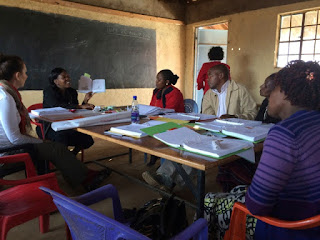
I spent the week before last with Joe Balog, the young man who came with me to Maasailand. He took pictures and videos in and around the work at Kimuka Village School. We culled the considerable collection and distilled 6 four-minute videos from them. A whole week out of young Joe’s life, sitting side by side with me, missing Halloween in New York City - so we could tell the story.
As we clicked and dragged the pictures and screen shots, I had a sense of malaise that I slowly recognized as a tinge of homesickness. How was it that I would miss a place that was:
- so harsh with its inhospitable rock-strewn roads, dust-filled air, starving cattle desperately licking leaf-bare thorny acacia trees;
- so worrisome with its unavoidable and potentially disease carrying water, food and mosquitos;
- so challenging with its primitive pit latrines, absence of harnessed electrons and all that they deliver, and cold showers that required something close to heroism.
Those qualities came through early on. When we were just about to start the full week of workshops, the last week of June, we interviewed each person working on the project. I asked them to speak about what they hoped they would get out of the inservice training. I asked them what concerns they had. Those interviews were videotaped so you can listen to them too. (See video) You will not hear anyone mention or bemoan the absence of chalk, pencils, paper, crayons, or books. In one way or another, each spoke about the needs of their students and their concern over meeting those needs.
As the days ticked by and bundled themselves into weeks, I was pricked with a sense of cognitive dissonance. The teachers and I had completed the week of workshops in which I rolled out the six-part model for daily instruction. I demonstrated, we practiced. Everything was new. The teachers were never taught about reading and writing. They were expected to read and write. Teaching reading and writing strategies was unheard of. (You can hear Chief Joseph talk about that on the video) However, everything we did was grounded in the proverb: “If a man is hungry and you give him a fish he will eat for a day. If a man is hungry and you teach him to fish, he will eat for the rest of his life.” Those words, that concept, resonated with everyone.
Only slightly tentative, each teacher took her turn in the morning, picture book in hand, to read aloud and think aloud by stopping to tell what she was wondering, tell what she thought was going to happen next or explain why she thought something in the story did happen. Each was practicing what she would do in her classroom to teach her children what good readers do. Not only would they talk about the story being read, they would teach how to read anything, anytime - teaching their students “to fish”.
What was that cognitive dissonance I was experiencing? Given the newness and strangeness of the methods, why wasn’t the work a struggle for these women? Instead of furrowed brows and awkward silence there was laughter, bright eyes and probing questions. When they finally stepped in front of their students for the reading hour everyday, each teacher unpacked what she had practiced and OMG they owned everything they had learned. Their students were right there with each of them. Start a question with the words, “What do you think...” and a sea of hands shot up on outstretched arms, fingers snapping, voices begging, “teecha, teecha, teecha”.
I did, for one brief moment, reach around and pat my back. It was the structure, the modeling, the clear explanations, the ample time to practice each day, the encouragement, the safe environment, I reasoned. But after all my years of experience working with teachers I could easily envision providing all of those things and still not lighting everyone’s fire. There was clearly something else at work - something I could not have taught for or planned for. It took some time, re-entry and some unforced reflection but I think I nailed the X factors. Needs were being met in Kimuka Village School which might not necessarily be felt so keenly back home.
There was an opportunity for these teachers in rural Kenya to fill a gap in their skills, an opportunity which they saw as a once in a lifetime opportunity. Then too, the teachers had expressed their fundamental, abiding desire to help “the little ones”. That is a powerful desire, as many of us know. And ultimately there is the joy the accompanies expansion, the inner excitement of becoming more of what you know you are meant to be.
Just as I had overlooked these forces that would be at play when I was worrying through the planning stages, others working to improve education in under-resourced communities need to realize the teachers bring their own power and potential to the table. The teachers we partner with in such places as Maasailand do not need propping up with scripted lessons, they need the opportunity to learn how to “fish.”





No comments:
Post a Comment